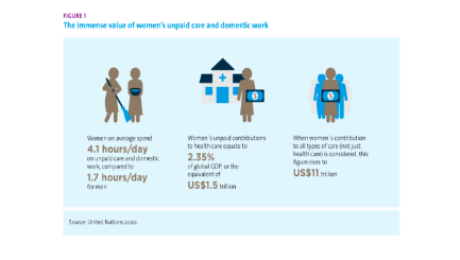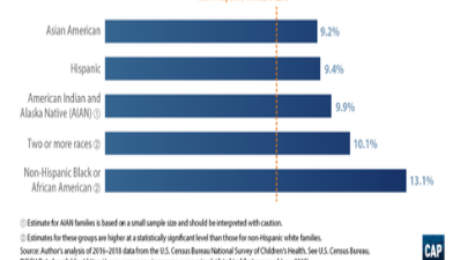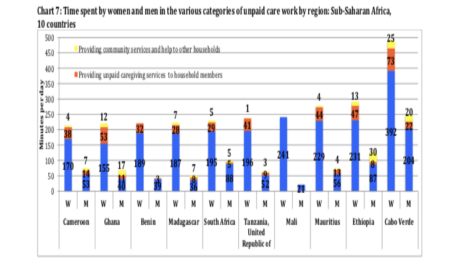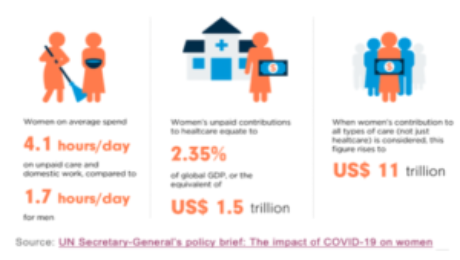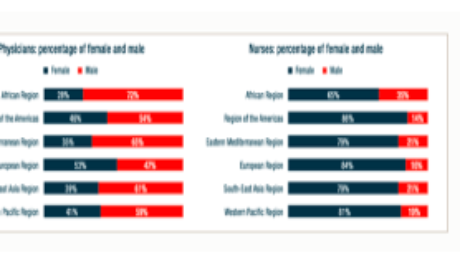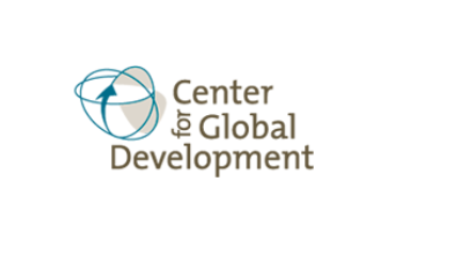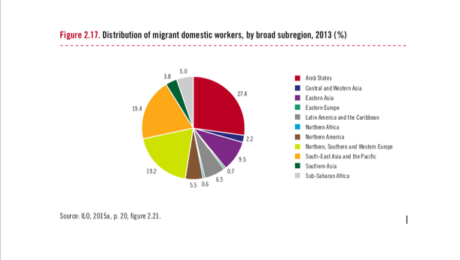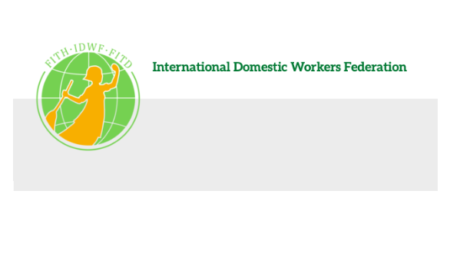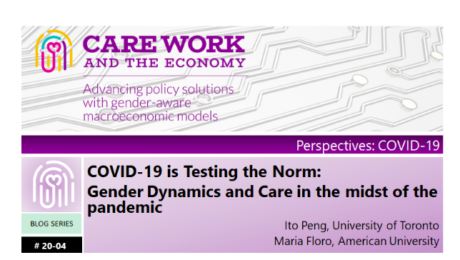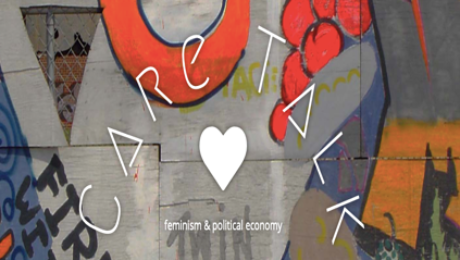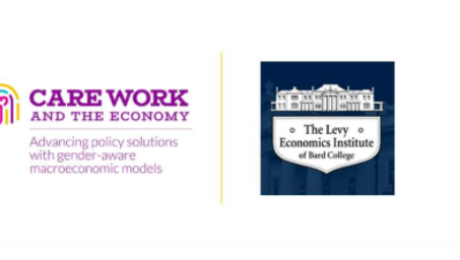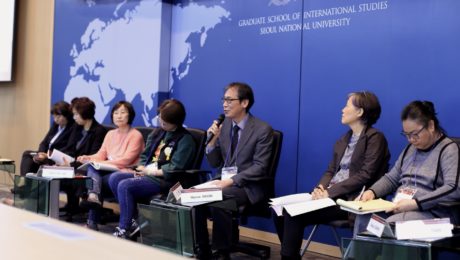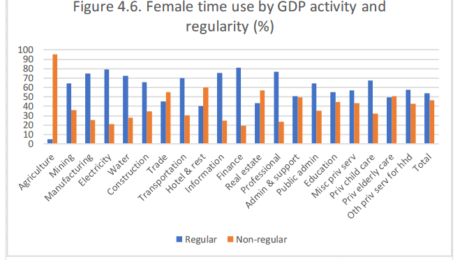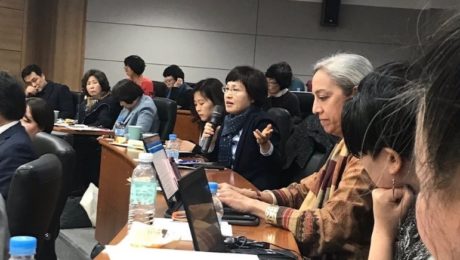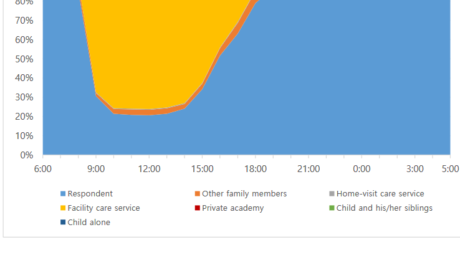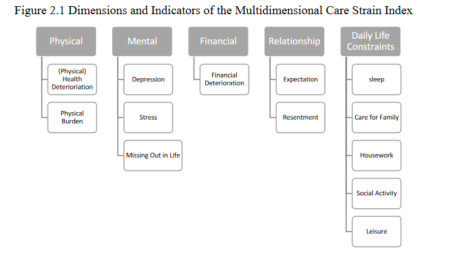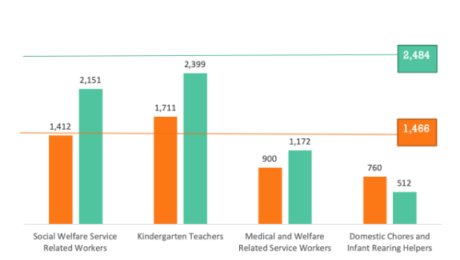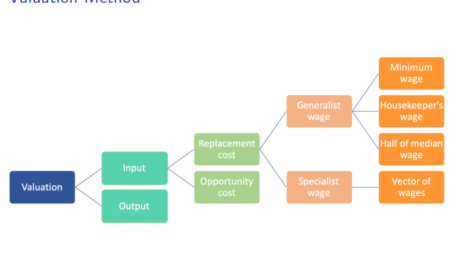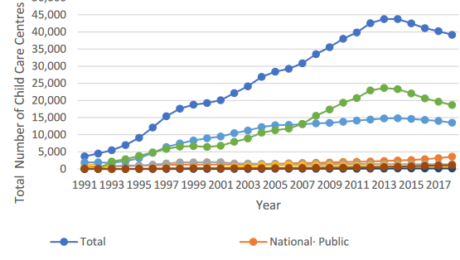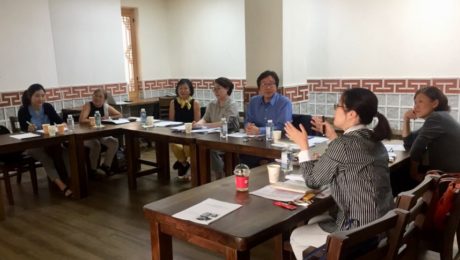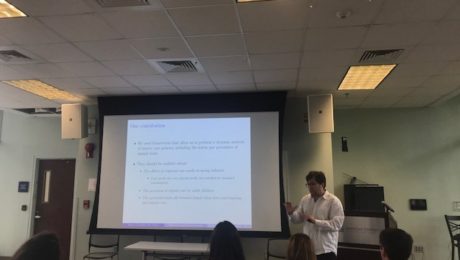Latest Blogs:
Reflections on Microfinance and the Care Economy
With rollback of the developmental state under the neoliberal policy regime, financial inclusion has come to be adopted as a developmental strategy. Micro-credit schemes, which were initially promoted as tools
- Published in Economic Modeling, Gender Inequalities, Rethinking Macroeconomics
Digital Forum on Reopening Long Island and Building a Fair Economy:Care Work in the COVID Crisis
Earlier this month, the Hofstra Labor Studies and the Center for the Study of Labor and Democracy in collaboration with Long Island Jobs with Justice and A.L.L.O.W. (Advancing Local Leadership
- Published in COVID 19, Expert Dialogues & Forums, Policy, U.S.
COVID-19 AND THE CARE ECONOMY: UN Women calls for immediate action and structural transformation for a gender-responsive recovery
A recent brief from UN Women presents emerging evidence on the impact of the COVID-19 global pandemic on the care economy. Evidence suggests that the rising demand for care in
- Published in COVID 19, Policy Briefs & Reports, UN Women
The True Cost of Caregiving: An Aspen Institute Digital Discussion
Even in a typical year, U.S. households are estimated to experience $31.9 billion in lost wages as a result of inadequate childcare and paid leave. Roughly 1 in 5 people living
- Published in Child Care, Expert Dialogues & Forums, Policy, U.S.
Inequalities in access to U.S. care services
In the U.S., states and localities are beginning to ease social distancing policies resulting from the pandemic. With many workplaces calling Americans to return to work, the nation’s care services
- Published in Child Care, Gender Inequalities, Race Inequality
The Covid-19 Care Penalty
In the U.S., as elsewhere, essential workers have been rightly praised for their willingness to take on additional risk and stress. Their commitment to helping patients, students, and customers face-to-face
- Published in COVID 19, Feminist Economics
Frontline Care Workers in the U.S.
A recent report on Basic Demographic Profile of Workers in U.S. Frontline Industries by the Center for Economic and Policy Research (CEPR) looks at six broad industries, employing grocery store
- Published in Child Care, COVID 19
Unpaid Work, Animated
About half of all the time devoted to work in the U.S. is devoted to unpaid work in the home. The Institute for New Economic Thinking has created an adorable
- Published in Expert Dialogues & Forums, Feminist Economics, Rethinking Macroeconomics
The Unpaid Care Work and the Labor Market. An analysis of time use data based on the latest World Compilation of Time-use Surveys
How much time do people spend on doing paid and unpaid care work? How do women and men spend their time differently on unpaid care work? Are there any differences
- Published in Child Care, elderly care, Policy Briefs & Reports
UN Women: COVID-19 and the Crisis of the Care Economy
In a recent UN Women blog post, Silke Staab explores ways in which the COVID-19 pandemic that has swept the globe is further compounding the risk and strain put upon
- Published in COVID 19, Gender Inequalities, UN Women
Responsibility Time
If there was ever a time we urgently needed to know more about time use, that time has come. The Covid-19 pandemic utterly changed daily rhythms for many sequestered households
- Published in Child Care, COVID 19, Policy Briefs & Reports, Time Use Survey
A Gender Lens on COVID-19: Investing in Nurses and Other Frontline Health Workers to Improve Health Systems
In a recent CGD blog post, author Megan O’Donnell highlighted seven areas where long-run, gender-responsive thinking can help to insulate against the consequences of pandemics like COVID-19 and their disproportionate impacts on
- Published in COVID 19, Gender Inequalities, Healthcare
How Will COVID-19 Affect Women and Girls in Low- and Middle-Income Countries?
Policymakers should be thinking—and worried—about how COVID-19 is expected to disproportionately affect women and girls. Gender inequality can come into even starker focus in the context of health emergencies. With
- Published in COVID 19, Healthcare
The Homemade Value-Added Stabilizer
“Shelter in place” mandates in the early stages of the U.S. Covid-19 pandemic required many people to stay home, cook their own meals, school their own children, and entertain themselves.
- Published in COVID 19, Time Use Survey, U.S., Unpaid Work
Playing the Long Game: How a Gender Lens Can Mitigate Harm Caused by Pandemics
When crisis hits, longer-term thinking can easily, and understandably, be cast as a distraction or a luxury—even when it relates to tackling critical issues like gender inequality, climate change, or
- Published in COVID 19, Gender-Equal Economy, Healthcare
Invisible Frontliners: Migrant Care Workers in the Time of COVID-19
The Covid-19 pandemic has exposed fault lines in national healthcare and social protection systems that have made many countries – developed as well as developing – unable to quickly and
- Published in COVID 19, Migrant Care Workers
“Being at Home” is Not Free – Making Informal Care Provision Visible and Providing Support During the Pandemic
The Japanese Government responded to the COVID 19 crisis by declaring a state of emergency and announcing an economic stimulus of 108 trillion yen, 6 trillion of which is allocated
- Published in COVID 19, Japan, Policy, South Korea
Those unprotected by the “economic stability shield”
This brief note raises two issues: First, the widening of gender inequalities in unpaid care work and second, the potential gendered outcomes of rising formal and informal unemployment in the
- Published in Gender Inequalities, Turkey, Unpaid Work
Domestic and Care Workers Under COVID-19
By definition, domestic workers are an essential part of the global care workforce. According to the ILO, there are 70 million domestic workers over the age of 15 working directly
- Published in Child Care, COVID 19, Domestic Workers, Policy Briefs & Reports
COVID-19 is Testing the Norm: Gender Dynamics and Care in the Midst of the Pandemic
The COVID-19 crisis has upended lives around the world. It has forced cities and countries to enforce lockdown and social distancing regulations. Schools and businesses are closed and people are
- Published in COVID 19, Gender Inequalities
Are We All Care Workers Now?
Who, exactly, are care workers, other than the people we need most right now, as the covid-19 pandemic overlays the division of labor with a new division of risk? I’ve
- Published in Child Care, COVID 19, elderly care
A Time for Reflection on Care
The world outside my study is churning and whirling… as it is engulfed with the fast-evolving health situations in communities around the globe. There are many unknowns about the COVID-19 illness
- Published in Child Care, COVID 19, elderly care, Maria Floro, Policy
Policy Brief for Gendering Macroeconomic Analysis and Development: A Theoretical Model for Gender Equitable Development
The CWE-GAM team presents an engendered macroeconomic model as a tool to analyze the role of gender equality and fiscal policy on growth and development.[1]The model incorporates realistic structural features
- Published in Economic Modeling, Gender Inequalities, Policy Briefs & Reports
A Gendered Social Accounting Matrix for South Korea
A social accounting matrix (SAM) is an economy-wide consistent representation of the payments in an economy, linking production, primary factors, and institutions (the latter often split into households, government, and
Glimpse of Family Caregivers’ Context: Actual time vs. Desired time for Care
Attitudes towards family care are changing. Only 27% of Koreans surveyed in 2018 agreed that the family is responsible for elderly family member care. As for population aging, the middle
Family Caregivers’ Elder Care: Understanding Their Hard Time and Care Burden
In response to the imminent aging problem in South Korea, the National Long-Term Care Insurance (NLTCI) system was introduced in 2008. The goal of the NLTCI was to give support
- Published in South Korea, Understanding and Measuring Care
Care Arrangement and Caregiving Activities in South Korea: An analysis of 2018 Care Work Family Surveys on Childcare and Eldercare
The rise of the care crisis in South Korea has evolved with Korea’s demographic shifts, increasing female work force participation, and changes in the norms and values of family and
- Published in South Korea, Understanding and Measuring Care
Measuring the Overall Strain of Caregiving: A Multidimensional Approach
Providing care for others, especially for the frail elderly and young children, is one of the most important forms of human work that sustains our existence. However, caregiving is also
- Published in South Korea, Understanding and Measuring Care
Methodology for Estimating the Paid Care Sector in South Korea
Care work, whether unpaid or paid, lies at the heart of humanitarian concern and expression, and our societies and economies are dependent on it to survive and thrive. Across the
- Published in South Korea, Understanding and Measuring Care
Methodology for Estimating the Unpaid Care Sector in South Korea
Mainstream economists continue to define economic growth in terms of conventional measures such as market employment and income per capita. Women’s taking on full-time employment outside the home, therefore, has
- Published in South Korea, Understanding and Measuring Care
An Overview of Care Policies and the Status of Care Workers in South Korea
The last couple of decades have seen a dramatic transformation of the care infrastructure in South Korea. This is evident from the introductions of successive government policies and programs to
- Published in South Korea, Understanding and Measuring Care
Policy Analysis in a Macroeconomic Model of Social Reproduction
Since the 1990s, unpaid work and care have garnered increasing academic attention, creating the emerging fields of the economics of unpaid work and the study of “the care economy.” Most
Informal Caregiving, Family Power Dynamics, and Labor Market Rigidities
A growing concern in many countries is an aging population and an increase in the number of elderly in need of long-term care (LTC). However, the economic and welfare implications
- Published in Understanding and Measuring Care
Impact of Investing in Social Care on Employment Generation, Time- and Income-Poverty and Gender Gaps: A Macro-Micro Policy Simulation for Turkey
CONTRIBUTORS İpek İlkkaracan, EMEL MEMIS, KIJONG KIM, TOM MASTERSON, and Ajit Zacharias Feminist economists have long emphasized the recognition, reduction and redistribution of unpaid care work (the so-called 3R strategy)
The Effects of Public Social Infrastructure and Gender Equality on Output and Employment: The case of South Korea
According to the Global Gender Gap Index of the World Economic Forum (2018), South Korea is one of the lowest ranked countries in the world in terms of “Economic Participation
- Published in Gender-Aware Macromodels, Policy, Rethinking Macroeconomics, South Korea
The Provision of Elderly Care and the Macroeconomy
The dramatic increase in life expectancy in most developed and developing countries over the last few decades has led to renewed discussions around elderly care policy options, and the debates
- Published in Rethinking Macroeconomics, South Korea
Options for modeling the distributional impact of care policies using a computable general equilibrium (CGE) framework
The importance of public investment and adequate care policies for gender equality has come to the forefront of the policy agenda in recent years. The Sustainable Development Goals framework for
- Published in Gender-Aware Macromodels, Rethinking Macroeconomics
50 Researchers Come Together for 2019 Annual Meeting
2019 Care Work and the Economy Annual Meeting in Glasgow, Scotland The Care Work and the Economy (CWE-GAM) held its 2nd Annual Meeting in Glasgow, Scotland on June 30-July 2,
- Published in Uncategorized
Bringing Together Research, Civil Society, and Policy Communities to Advance the Policy Discussion on Care in South Korea
Hyun Lim Lee, kindergarten teacher and organizer for the Childcare Workers Chapter of the Korean Confederation of Trade Unions, stood in front of the room full of civil society organization
- Published in South Korea
Microfinance and the Care Economy
Financial inclusion has been adopted as a developmental strategy with the roll-back of the developmental state under the neoliberal policy regime. As a result, mainstream private finance has utilized microcredit
- Published in Research, Rethinking Macroeconomics
(More) Economic Lessons from the Great Recession of 2008
The global financial crisis that began in 2008 resulted in the widespread destruction of jobs. Effects were felt disproportionately among subordinate racial groups and women. While mainstream analyses emphasize regulatory
- Published in Research, Rethinking Macroeconomics
Gendering Fiscal Policy
The importance of public physical infrastructure in stimulating productivity and economic performance is embraced by most economists. However, there is less awareness that public spending in health, social care, education,
- Published in Research, Rethinking Macroeconomics, Uncategorized
Estimating the Role of Social Reproduction in Economic Growth
This paper presents a conceptual Kaleckian macroeconomic model and empirical analysis that link structures of economic growth and development with those of social reproduction and gender inequality.
- Published in Research, Rethinking Macroeconomics


